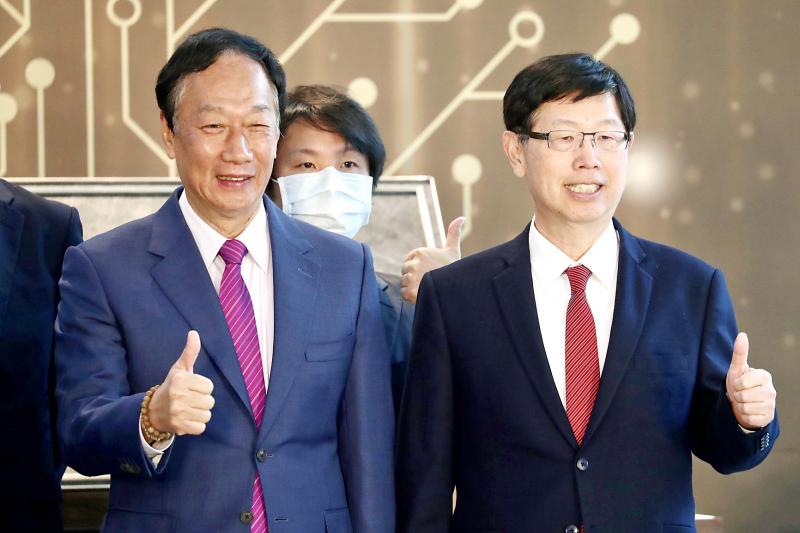Geopolitical tensions between India and China are beginning to hurt some of Taiwan’s biggest technology companies, including suppliers to Apple Inc, and hindering New Delhi’s much-vaunted incentive program for electronics manufacturing.
India has been slow to issue visas to Chinese engineers, who are needed to help Taiwanese companies set up factories in the South Asian nation, people with knowledge of the matter said on condition of anonymity.
India is also nudging companies to opt for employment permits, which are more difficult to obtain, they added.

Photo: Ritchie B. Tongo, EPA-EFE
The wrangling might delay Indian Prime Minister Narendra Modi’s plan to bolster India’s manufacturing capacity and deter overseas investors, who invested US$30 billion in the six months to September last year, with the maximum foreign direct investment flowing in the computer hardware and software sector.
The companies are looking to India to diversify their supply chains.
Modi has banned hundreds of Chinese apps and slowed approvals for Chinese investment after a deadly clash along the disputed border between the two neighbors.
Last year, companies such as iPhone assemblers — Hon Hai Precision Industry Co (鴻海精密), known internationally as Foxconn Technology Group (富士康科技集團); Pegatron Corp (和碩); and Wistron Corp (緯創) — along with many others pledged US$1.5 billion to set up mobile phone plants in India after the Modi government offered them specially designed incentives to manufacture their products locally for global export.
The move was also expected to shift supply lines to India from China.
Apart from delays in granting visas, the Indian government has indicated a preference for issuing employment visas instead of business visas for people required to set up the production lines that are being imported by companies, the people said.
Employment visas typically require more paperwork and background checks from the Indian Ministry of Home Affairs, and could therefore be the reason for India’s insistence. Business visas also have a shorter duration.
Companies have balked at the employment permits because it increases costs. It also leads to double taxation for engineers and technicians, as they continue to be employed by their respective companies in China.
Skilled professionals and experts are also needed for training and guidance on machines that are being installed for the first time in the country, along with specialists to monitor the entire process.
The development comes at a time when New Delhi is under pressure to boost growth in Asia’s third-largest economy, which is set for its worst annual contraction since 1952 with millions losing their jobs and being pushed into poverty due to the COVID-19 pandemic.
The incentive program for mobile makers alone envisages the production of 10.5 trillion rupees (US$145.5 billion) of smartphones and exports of 6.5 trillion rupees over the next five years. It is likely to create more than 800,000 jobs.
Chinese Ministry of Foreign Affairs spokeswoman Hua Chunying (華春瑩) yesterday said that she was not aware of visa delays by India for Chinese engineers, and referred questions to the Indian authorities.
Asked whether Indian workers faced delays coming to China, she said that Beijing is “flexibly adjusting” its border entry measures.
“We are willing to uphold an orderly flow of personnel,” she said.

A magnitude 7.0 earthquake struck off Yilan at 11:05pm yesterday, the Central Weather Administration (CWA) said. The epicenter was located at sea, about 32.3km east of Yilan County Hall, at a depth of 72.8km, CWA data showed There were no immediate reports of damage. The intensity of the quake, which gauges the actual effect of a seismic event, measured 4 in Yilan County area on Taiwan’s seven-tier intensity scale, the data showed. It measured 4 in other parts of eastern, northern and central Taiwan as well as Tainan, and 3 in Kaohsiung and Pingtung County, and 2 in Lienchiang and Penghu counties and 1

A car bomb killed a senior Russian general in southern Moscow yesterday morning, the latest high-profile army figure to be blown up in a blast that came just hours after Russian and Ukrainian delegates held separate talks in Miami on a plan to end the war. Kyiv has not commented on the incident, but Russian investigators said they were probing whether the blast was “linked” to “Ukrainian special forces.” The attack was similar to other assassinations of generals and pro-war figures that have either been claimed, or are widely believed to have been orchestrated, by Ukraine. Russian Lieutenant General Fanil Sarvarov, 56, head

FOREIGN INTERFERENCE: Beijing would likely intensify public opinion warfare in next year’s local elections to prevent Lai from getting re-elected, the ‘Yomiuri Shimbun’ said Internal documents from a Chinese artificial intelligence (AI) company indicated that China has been using the technology to intervene in foreign elections, including propaganda targeting Taiwan’s local elections next year and presidential elections in 2028, a Japanese newspaper reported yesterday. The Institute of National Security of Vanderbilt University obtained nearly 400 pages of documents from GoLaxy, a company with ties to the Chinese government, and found evidence that it had apparently deployed sophisticated, AI-driven propaganda campaigns in Hong Kong and Taiwan to shape public opinion, the Yomiuri Shimbun reported. GoLaxy provides insights, situation analysis and public opinion-shaping technology by conducting network surveillance

‘POLITICAL GAME’: DPP lawmakers said the motion would not meet the legislative threshold needed, and accused the KMT and the TPP of trivializing the Constitution The Legislative Yuan yesterday approved a motion to initiate impeachment proceedings against President William Lai (賴清德), saying he had undermined Taiwan’s constitutional order and democracy. The motion was approved 61-50 by lawmakers from the main opposition Chinese Nationalist Party (KMT) and the smaller Taiwan People’s Party (TPP), who together hold a legislative majority. Under the motion, a roll call vote for impeachment would be held on May 19 next year, after various hearings are held and Lai is given the chance to defend himself. The move came after Lai on Monday last week did not promulgate an amendment passed by the legislature that